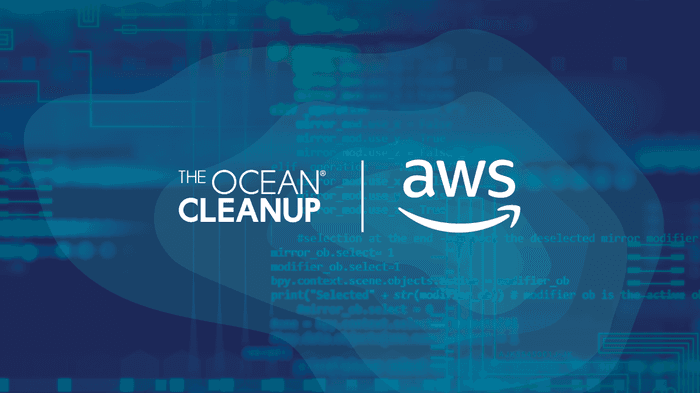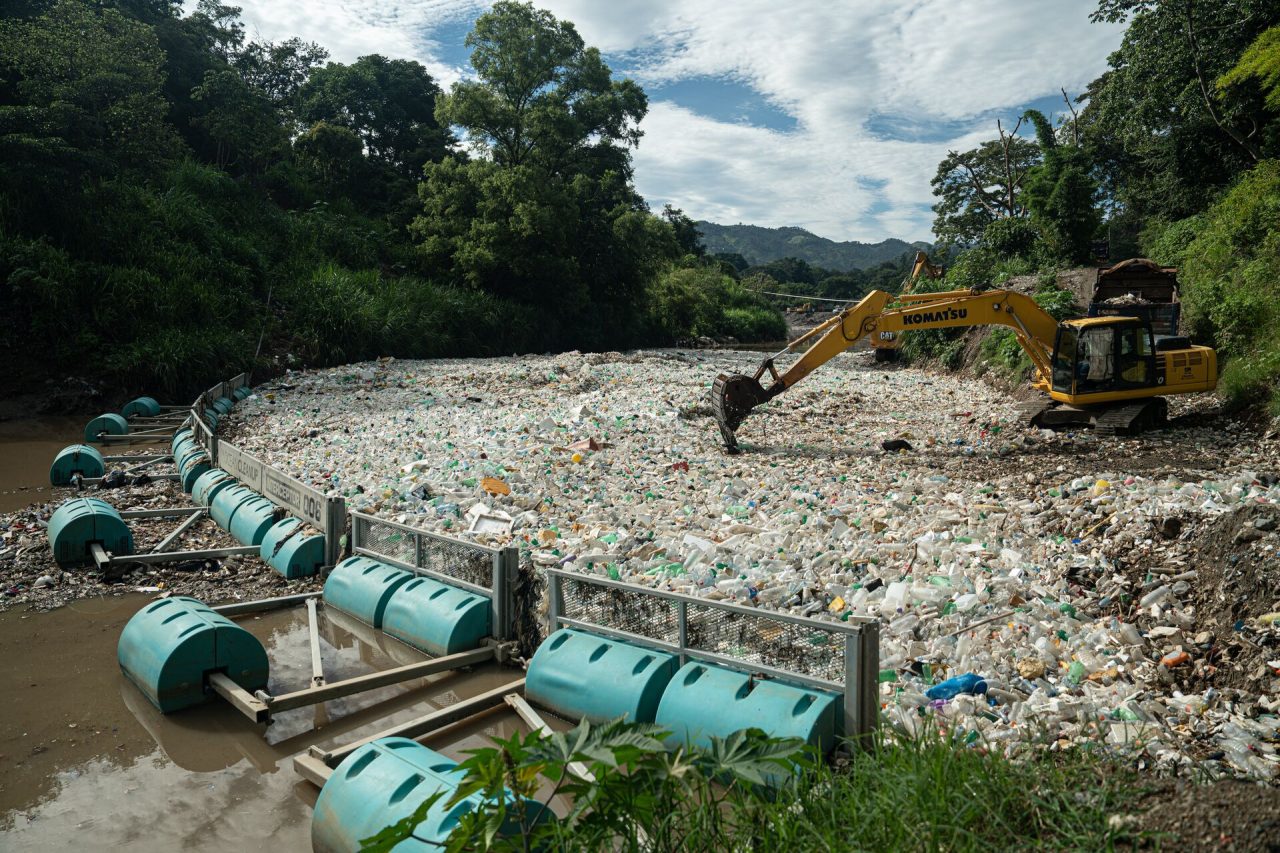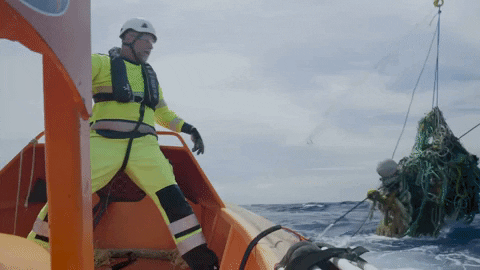
The Ocean Cleanup and AWS Join Forces to Accelerate Ocean Plastic Removal using AI
Back to press- Advanced AI detection systems and cloud computing will power the future of Ocean plastic removal while safeguarding marine ecosystems
New York – July 15, 2025– The Ocean Cleanup, a non-profit organization dedicated to ridding the world’s oceans and rivers of plastic pollution, today announced a collaboration with Amazon Web Services, Inc. (AWS), an Amazon.com, Inc. company (NASDAQ: AMZN). This collaboration will leverage AWS’s advanced artificial intelligence, machine learning, and cloud computing capabilities to enable and accelerate The Ocean Cleanup’s goal to clean the Great Pacific Garbage Patch (GPGP) and remove 90% of floating ocean plastic by 2040.
Recent research by The Ocean Cleanup found that the GPGP is impeding the ocean’s ability to help regulate the climate while also being harmful to marine life. Extracting plastic debris is essential to protect marine ecosystems, preserve biodiversity, and prevent its disintegration into microplastics that enter the food chain.
The Ocean Cleanup has already removed 64 million pounds of marine trash worldwide but faces an enormous challenge in finding and extracting the dispersed plastic fragments that continue to pollute our oceans.
AWS’s AI-powered detection systems and comprehensive cloud infrastructure will accelerate and scale this effort by enabling precise tracking of plastic accumulation and predictive modeling of debris movement. This will enable more optimized resource management and operational efficiency—significantly enhancing The Ocean Cleanup’s ability to detect, track, and remove ocean plastic while simultaneously protecting marine life. As these initiatives progress, The Ocean Cleanup, AWS, and Amazon anticipate uncovering new opportunities to deepen their collaborative approach to environmental challenges.
“Plastic pollution represents one of the most pressing environmental challenges of our time, and The Ocean Cleanup’s mission is vital for the health of our planet,” said Dr. Werner Vogels, CTO of Amazon.com. “This collaboration demonstrates how advanced cloud computing and AI can serve as powerful tools for environmental stewardship, not only transforming oceanic data into actionable insights but also creating a blueprint for how technology can address critical environmental challenges across the globe.”
To overcome the enormous scale and complexity of ocean plastic pollution, the collaboration will focus on two mission-critical initiatives that address current technological limitations and challenges by:
- Developing a New AI-Powered System for Enhanced Ocean Plastic Detection and Tracking: Through the development and implementation of an advanced artificial intelligence and machine learning platform, The Ocean Cleanup will be able to more effectively identify, track, and predict ocean plastic accumulation. Initially, this initiative will focus on developing “hotspot hunting” capabilities for the GPGP—where floating plastic is unevenly dispersed across the ocean surface like a thin soup. AWS will provide a range of technologies from IoT, satellite, and edge computing to deploying drones and ruggedized flotation devices to precisely track plastic accumulation. By leveraging high-performance computing for advanced data modelling, AWS will support The Ocean Cleanup in the creation of a “plastic navigation” system that predicts debris movement and optimizes cleanup operations. The solution will integrate data from multiple sources including open data mechanisms and The Ocean Cleanup’s data models, allowing ships to be steered toward optimal collection areas based on near-real-time measurements.
- Implementing a Cloud-Based Infrastructure for Marine Life Protection: Through the creation of new AI-driven technologies, AWS will help The Ocean Cleanup further improve their marine life detection systems. Additionally, this automated capability will reduce The Ocean Cleanup’s need for Protected Species Observers, individuals who provide continuous cleanup monitoring 24 hours a day. This will help to reduce costs and allow even more resources to be directed to plastic extraction.
“Innovation and cutting-edge technology have always been at the heart of our approach to achieve our mission to rid the world’s ocean of plastic,” said Boyan Slat, CEO and Founder of The Ocean Cleanup. “Our collaboration with AWS has the potential to deliver significant advancement in our capabilities. With AWS’s technology, we can then better locate plastic hotspots, optimize our cleanup operations, and ensure we’re protecting marine ecosystems while removing harmful plastic debris to achieve our ultimate goal of a 90 per cent reduction in global ocean plastic pollution.”
Success for this collaboration will be measured in plastic removed from the world’s oceans and rivers. By equipping The Ocean Cleanup with AWS’s AI-powered detection systems and cloud infrastructure, the efficiency and effectiveness of worldwide plastic cleanup operations will be significantly increased. Together, AWS and The Ocean Cleanup are not only accelerating ocean cleanup, but they also are demonstrating a model for how technology can be developed and deployed to protect the planet’s most vital ecosystems.
About The Ocean Cleanup
The Ocean Cleanup is a nonprofit organization that develops and scales technologies to rid the oceans of plastic. By conducting extensive research, engineering scalable solutions, and partnering with governments, industry, and like-minded organizations, The Ocean Cleanup is working to stop plastic inflow via rivers and remove legacy plastic already polluting the oceans. As of June 2025, the non-profit has collected over 29 million kilograms (63.9 million pounds) of trash from aquatic ecosystems around the world. Founded in 2013 by Boyan Slat, The Ocean Cleanup now employs a multi-disciplined team of approximately 200 people. The organization is headquartered in Rotterdam, the Netherlands, with international operations in 10 countries.
About Amazon Web Services
Since 2006, Amazon Web Services has been the world’s most comprehensive and broadly adopted cloud. AWS has been continually expanding its services to support virtually any workload, and it now has more than 240 fully featured services for compute, storage, databases, networking, analytics, machine learning and artificial intelligence (AI), Internet of Things (IoT), mobile, security, hybrid, media, and application development, deployment, and management from 117 Availability Zones within 37 geographic regions, with announced plans for 13 more Availability Zones and four more AWS Regions in Chile, New Zealand, the Kingdom of Saudi Arabia, and the AWS European Sovereign Cloud. Millions of customers—including the fastest-growing startups, largest enterprises, and leading government agencies—trust AWS to power their infrastructure, become more agile, and lower costs. To learn more about AWS, visit aws.amazon.com.

